Monster Manual
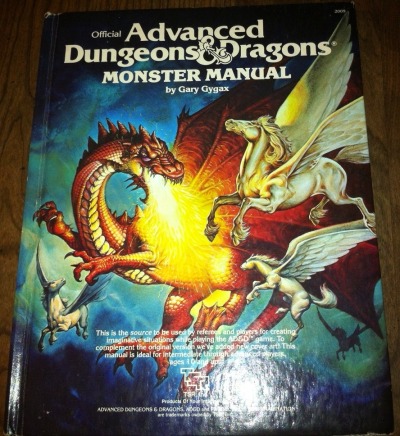
This wasn't my first RPG book but it was definitely the first one I read cover to cover and the first one I wore out the cover from rereading, use, and abuse. The one pictures here is the third copy I've owned. As long as I had my Monster Manual I felt I could GM anything. That kind of "give me some stats and I'll do the rest" attitude still informs my style, though when I was younger I really did not know how to string a plotline together very well.
*sigh*
To be eight years old again. "The wizard is turning everyone into trolls... because he's evil!"
I6 Ravenloft
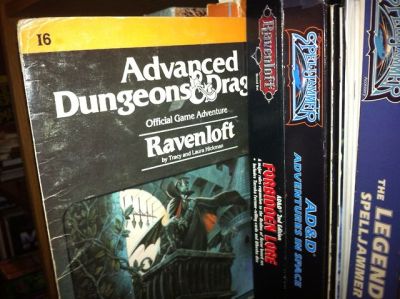
When I was maybe 9 years old I knew this older kid who played D&D. He was like really old though, like 16 or 17 maybe. But anyway, he wouldn't play with me unless he was the GM and I was a PC. He ran Ravenloft as a solo adventure for me and that lasted for a couple of weeks before he got bored and stopped playing with me. But during that short game I haggled with gypsies, escaped wolves in the dark of the forest, explored the town of Barovia, and fought Count Strahd in his own castle. I thought it was the coolest thing, and playing with that older kid was the best D&D got for me until I discovered my friendly local game store. (It's a shame I can't remember his name though.)
This was also the first adventure module I ever purchased.
Birthright
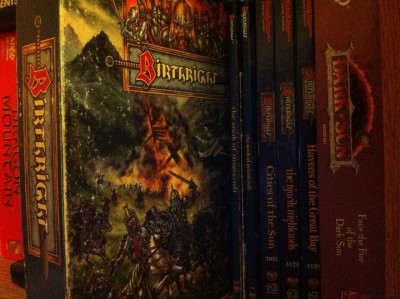
This is my favorite published campaign world and the Ruins of Empire book from the box set is probably the highlight of this set. There are lots of details provided for every single section of land in the world, and yet much of the world itself is left open for GMs and players to define what's going on within each country and around every established character. The rules for Bloodlines and Regency are fairly unbalanced and I've often converted the world to other RPG systems, but there's lots of good ideas and history loaded into a small space. The rules for ley lines, channeling magical power, and controlling sources of power are particularly cool.
Planescape
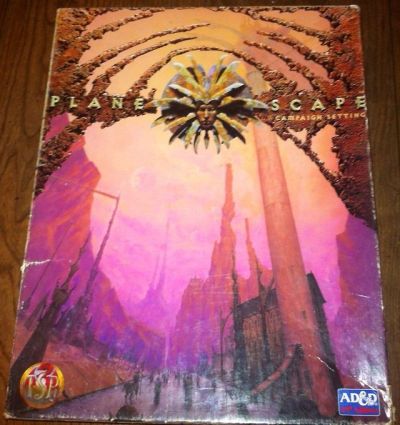
Tony Diterlizzi's artwork does a lot to give Planescape it's edge. When the Deet stopped drawing Planescape books that's when their sales started to fall, I don't think that's a coincidence. It's also probably not a coincidence that the only Planescape books available from WOTC are ones that don't have Tony's artwork.
The rules were just 2nd edition AD&D add-ons, but the setting material is inspired and fun. My first forays into GMing took place within Sigil, the City of Doors.
Mage: the Awakening
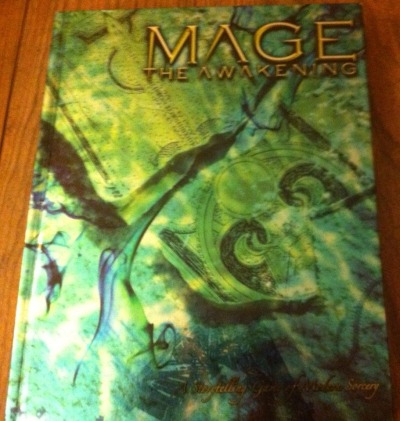
Mage the Ascension was not my first exploration outside of D&D, but the first one that really grabbed me by the imagination and inspired me to play something else. I mention the original version of Mage because it has consistent qualities with the reboot. Sessions of Ascension would often have lengthy debates about how to best use the spheres of magic to accomplish something, and I think Awakening fixed a lot of those problems by making it all relatively straightforward. Awakening didn't have strong central villains like Ascension though, so mixing the setting of Ascension with the rules of Awakening is probably the best way to play this game. I still love both of them, but Awakening moreso.
HOL
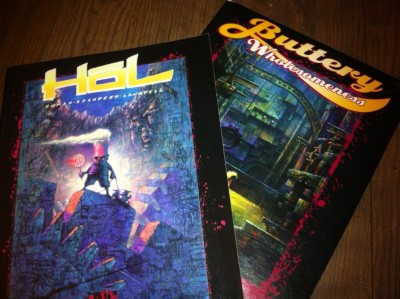
I can't emphasize how much I love this book! Not really a game as much as it is a parody of a game. You can still play it and I have, but it works more as a joke and playing it should never be done seriously. It's sole expansion has rules for an awesome little LARP called "Freebase" that viciously parodies every single anti-D&D screed produced by fear-mongering churchy conservatives in the 1980s. However most gamers I know refuse to even read HOL since it's handwritten, but if you can get past the weird format it is perhaps the funniest piece of RPG writing ever produced.
Stars Without Number
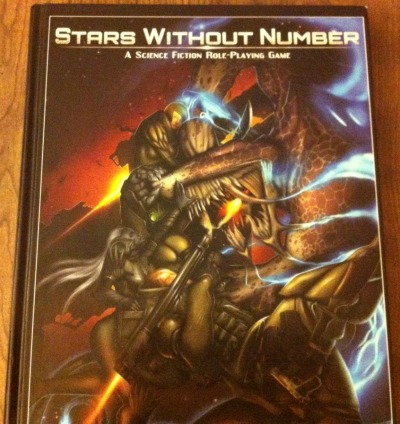
I discovered the OSR by accident because of this book. I was looking for stuff to make a Traveller campaign out of and after reading about the tag system introduced in this book I decided to look for a copy. The no-art pdf is free and after I downloaded it I liked it so much that I bought a hardcover copy. I enjoy the dual familiarity and simplicity of the system presented in the rules, but the tag system is really the best part of this rulebook. Most of Kevin Crawford's other work is equally on par with this title.
Apocalypse World
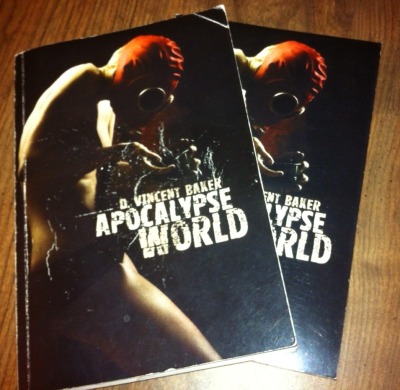
Written in such a way that it tells a complete novice how to play an RPG without ever using the cliched "What is a role-playing game?" kind of introduction that almost every RPG rulebook has. It illustrates and codifies how to GM effectively by giving the GM an agenda with principles to follow and moves to make when the players fail or look to you for more action. Because I learned role-playing primarily in the 1990s I used to be one of those GMs who crafted a story and then thrust it at my players, but since reading this book I have revised my GMing style so thoroughly that whenever I think of running a new game I always default to thinking of the prospective campaign in terminology which is central to Apocalypse World's design. Nothing about the advice in this game is particularly new, but it's presentation and delivery is cut from 100% originality and that makes all the difference.
Deadlands RPG

Rather than a single book I would like to say this whole game is one of my favorite RPG things! I played in an ongoing Deadlands campaign for roughly eight years and spent so much time with the books and the setting that (even though I have only played it three times in the last decade) I can still remember all of the weird and fiddly little rules. The GM who ran our eight-year long campaign passed away in 2005 and I doubt any of us who played it will ever be able to return to the game without remembering our time with him. I can't really call this a favorite game, but it does hold many fond and bittersweet memories for me.
GURPS Illuminati
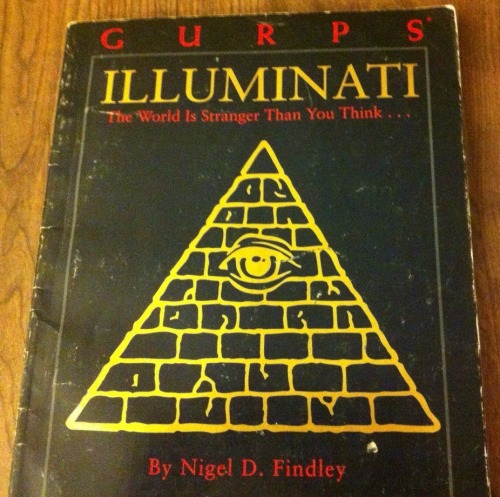
Saving the best for last! So I guess I did end up rating these titles in some way, but this is the only RPG book in my collection which I have adamantly insisted to other GMs that they purchase and read cover to cover. It is the best "How to mess with your players' heads" guide out there. The theories, tips, stories, anecdotes, and ideas in this book are not just good tips for making an Illuminati campaign, but are good tips for making any campaign deep and interesting. It's filled with useful GMing advice, but it's also a treat to read.
Also, I have a lot of gaming books.
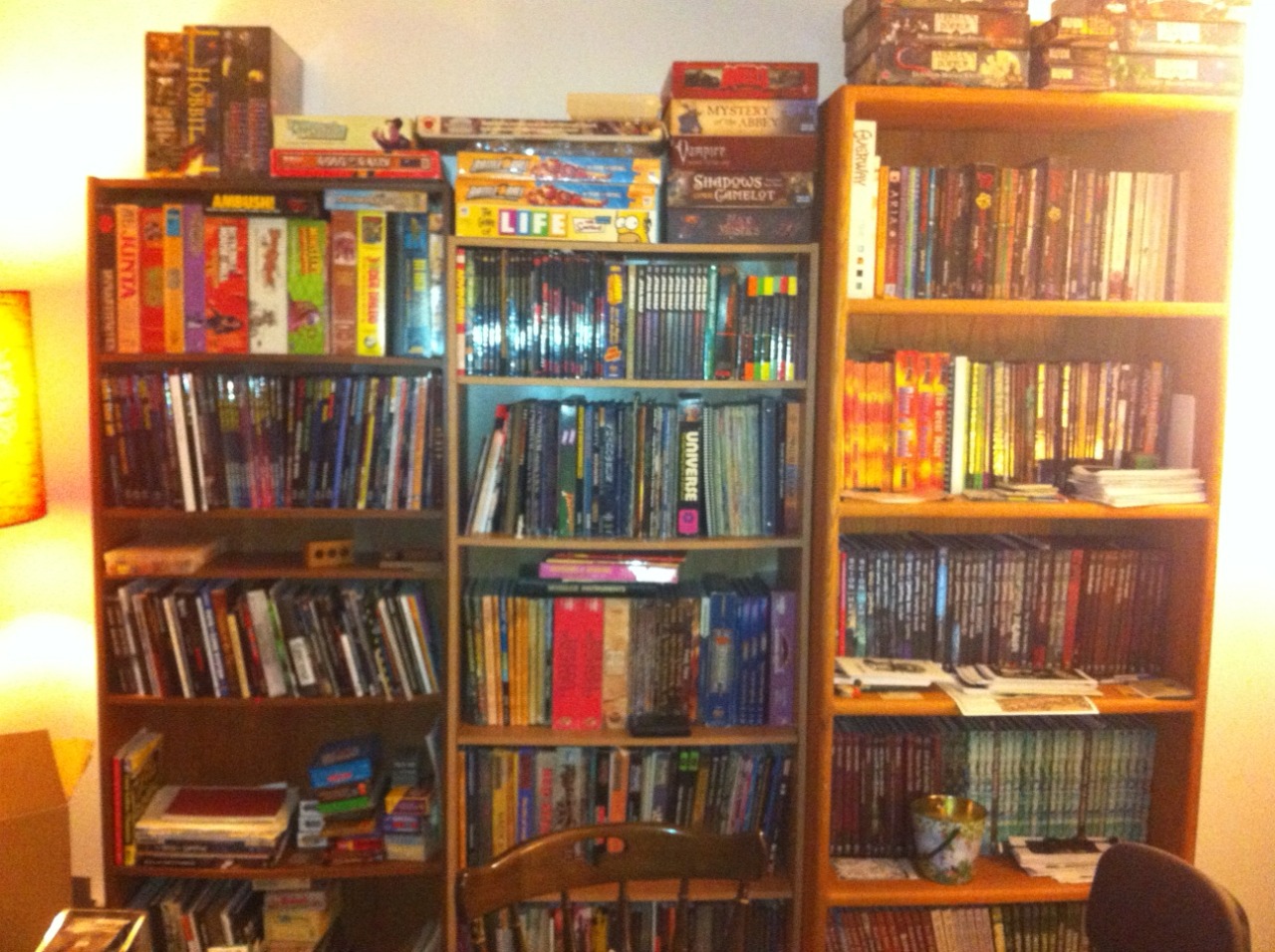
This isn't even everything I've ever owned or read, just the stuff that I still happen to own.

Deadlands is pretty boss; and I am so jealous of your collection!
ReplyDeleteI'm jealous of your bookshelves. Most of my collection is shoved into cardboard boxes in the attic :(
ReplyDeleteDon't be too jealous, I might be going that route very soon. :-/
Delete